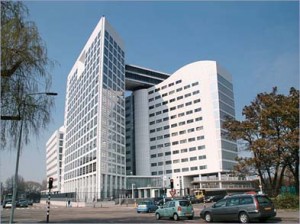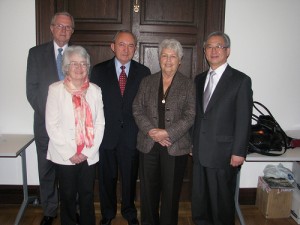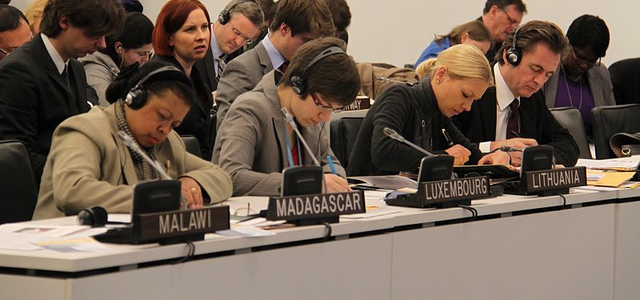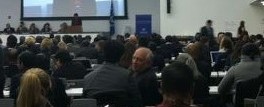
Reciprocal arrangements or “vote trading” is a principal frustration in promoting merit-based elections in inter-governmental organizations. A number of civil society groups vocally oppose such political agreements where governments will mutually agree to support the other’s nominee for a post regardless of their qualifications or lack thereof.
Concerns about such political agreements affecting this year’s judicial elections at International Criminal Court have prompted the Coalition for the ICC – a network of over 2,500 member organizations from all around the world – to be more than just vocal.
“In order to enhance the nomination process, the Coalition for the International Criminal Court (CICC) will help publicize and raise awareness of the elections and candidates put forward by States Parties,” CICC Convenor William R. Pace said. “Since 2003, the Coalition has been promoting informed decision-making by States Parties by ensuring that the qualifications and expertise of candidates for election are as transparent as possible,” he explained.
As part of a global campaign on the Court’s elections launched last November, the campaign will promote the nomination and election of the highly qualified officials with assistance from civil society partners, governments and international/regional institutions, and an independent panel of experts.
Independent Panel on ICC Judicial Elections

The Independent Panel on ICC Judicial Elections is a unique and independent initiative by civil society, intended to play a critical role in assessing States Parties’ nominees to the ICC bench – a critical gap in the election process.
The Panel is composed of highly qualified and respected legal officials, including:
- The Honourable Richard J. Goldstone (Chair), former Chief Prosecutor of the UN International Criminal Tribunals for Rwanda and the former Yugoslavia
- The Honourable Patricia Wald (Vice-Chair), former Chief Judge of the United States Court of Appeals for the District of Columbia and former Judge of the UN International Criminal Tribunal for the former Yugoslavia
- The Honourable Hans Corell, former Judge of Appeal and former Under-Secretary-General for Legal Affairs and the Legal Counsel of the United Nations
- Judge O-Gon Kwon, Judge and Vice President of the UN International Criminal Tribunal for the former Yugoslavia and former Presiding Judge at the Daegu High Court
- Dr. Cecilia Medina Quiroga, Director of the Human Rights Centre at the University of Chile and former Judge and President of the Inter-American Court of Human Rights
How will the Panel Work?
The Panel will look at each candidate on a rolling basis as he or she is nominated by a State Party and as new information becomes available.
The Rome Statute requires that candidates possess a number of qualifications. These include language proficiency, qualification for national judicial service and proof of competence in criminal or international law.
- Language. Candidates must prove that they can work at a high level post using one of the working languages at the ICC (English and/or French), which presents a clear disadvantage for non-native English or French speakers. This part of the assessment won’t require much of the Panel’s time as it can be easily assessed.
- National requirements. Article 36 of the Rome Statute required that candidates meet the minimal qualifications to be appointed to the highest judicial offices within their own government. In most countries, these standards are established by law; in others, by political appointment. In this regard, the Panel will need to consider that some countries do not require that a candidate hold a law degree or have judicial experience to be part of the highest judicial body; rather a degree in politics or international relations is sufficient to be appointed to the supreme court.
- Proof of competence. In terms of the established competence in criminal law or international law required under the Statute, diplomas, certificates and decisions can serve as proof.
The Panel has the difficult task of assessing not only these basic qualifications of each candidate, but his or her high moral character, impartiality and integrity. The Panel will review a number of documents submitted as part of each candidate’s nomination to arrive at a determination of their qualification to serve on the bench. These will include the note verbale required for all nominees, statements provided to the Secretariat on the candidate’s moral character, his or her curriculum vitae, any campaign materials distributed by the candidate and the nominating State Party, and a judicial candidate questionnaire developed by the CICC. The Panel can also consider other relevant and public documents, such as legal writings, articles, speeches and interviews with the media.
It is important to note that a Panel member will not assess any candidate that shares his/her nationality or when his/her impartiality might be doubted on any grounds. In the absence of sufficient information on which to make an assessment, the Panel shall note that it is unable to determine whether or not the candidate is qualified.
The Panel’s Report
The Panel’s report will review its composition and leadership, a summary of the judicial nomination process, and the following:
- A list of all of the candidates assessed by the Panel;
- The materials and resources used to assess the candidates;
- An assessment of each candidate as “Qualified” or “Not Qualified” (in the latter case, there shall be an explanation);
- If a decision was not reached by consensus but by a majority of the Panel members, a statement to this effect and any minority views, if the minority Panel member(s) so request, will be included in the report; and
- Any decisions in which certain Panel members did not participate, and the names of those Panel members.
The report of the Panel will be prepared and released publicly following the close of the nomination period in early September and in advance of the December election. (The Panel may issue a supplement to its report if the nomination period is extended and additional candidates are nominated or if there are changes to nominations.)
Subscribe to Global Memo for the latest information on the Panel’s work as it become public.



One thought on “Civil Society Gets Involved: the Independent Panel”